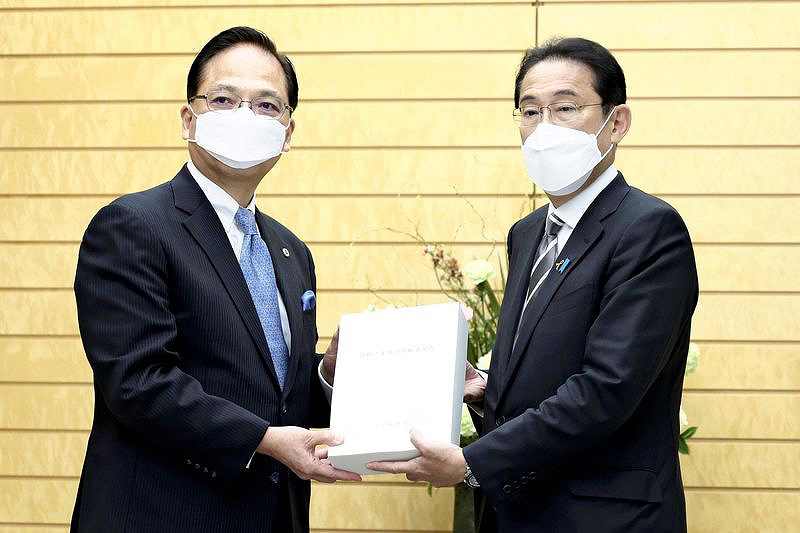
Prime Minister Fumio Kishida, right, receives a report from Yuji Morita, Commissioner of the Board of Audit of Japan, at the Prime Minister’s Office in Tokyo on Friday.
November 6, 2021
Of the ¥65.4 trillion the government earmarked to deal with the COVID-19 pandemic in fiscal 2019 and 2020, ¥22.8 trillion has not been spent, with most of the funds carried over to the next fiscal year, according to the Board of Audit of Japan. This is mainly due to the government securing a large amount of funds amid uncertainty over the impact of the pandemic.
The board submitted a report to the government on Friday, calling for proper budget execution and explanations to the public.
According to an analysis of 770 projects clearly used for COVID-19 countermeasures, the budget allocated for that purpose reached ¥65.4 trillion, including reserve funds and funding in supplementary budgets. Of that, ¥42.5 trillion, or 65% of the budget, had been used by the end of fiscal 2020.
For scale, that amount exceeds the ¥35 trillion 10-year reconstruction budget for the 2011 Great East Japan Earthquake. Of the unused ¥22.8 trillion, 95% was carried over to the next fiscal year.
Economic and employment measures accounted for the largest share of the unused budget. Funds used in that field totaled ¥13.5 trillion for 296 projects.
Regarding extraordinary grants to revitalize regional areas to be used for three projects to offer such as subsidies for restaurants and other establishments that cooperated with requests for shorter working hours, only 33% of the budget was used while ¥5.2 trillion remained unspent. This is reportedly because prefectural governments responsible for providing the benefits were unable to keep up with the administrative work.
In 301 projects to prevent infections, ¥3.3 trillion was left unused.
In the field of economic and employment measures, ¥1.5 trillion, or over 65% of the budget, was carried over as the government’s Go To Travel campaign to promote tourism was suspended due to the spread of the coronavirus.
As for infection prevention measures, 82 million cloth masks worth ¥11.5 billion, prepared by the government for distribution to all households and nursing homes, had not been used as of the end of March.
In a project to cover the hospitalization costs of COVID-19 patients at public expense, 43% of the budget was left unspent. “With no idea how many people would be infected, it was difficult to anticipate the necessary budget,” a Health, Labor and Welfare Ministry official said.
Motohiro Sato, a finance professor at Hitotsubashi University, said: “The unprecedented crisis has forced the government to secure a large budget, resulting in waste and logjams. In order to make good use of lessons learned in the future and not to increase the burden on future generations, the government needs to explain the effects after looking back thoroughly.”
Taxpayer money wasted
Looking at government finances more generally, the Board of Audit of Japan also found that about ¥211 billion of taxpayer money had been wasted or improperly reported by the central government in fiscal 2020. The bulk of that amount was attributable to the Finance Ministry’s handling of gold bullion.
According to the Audit Report for fiscal 2020, released Friday, the board found 210 cases of waste or mismanagement worth a total of ¥210.872 billion.
The number of cases was lower than the previous year’s figure of 248, which itself had been the lowest since fiscal 1994. However, circumstances of the pandemic reportedly kept the board from conducting as many on-site inspections as it normally would.
It was able to inspect only 1141 locations including ministries, agencies and offices of independent administrative corporations this year. The number of the locations inspected was down 585 from the previous year.
In yen terms, the Finance Ministry accounted for ¥160.1 billion, the largest amount. The board pointed out that although the ministry held about 130 tons of gold bullion to make commemorative coins, it had recently used very little for that purpose. After the board pointed this out, the ministry sold 80 tons of the gold, which led the board to judge that the ministry had failed to make use of that amount.
The Agriculture, Forestry and Fisheries Ministry was responsible for the next largest total at ¥22.7 billion. The board noted that the ministry has not updated the farmland information browsing system, which the ministry spent ¥13.7 billion developing, among other issues.
Of all cases listed in the report, there were 157 “improprieties,” or matters involving violations of the law or extremely wasteful spending, with improper amounts totaling ¥6.633 billion. The number of such cases was down 48 from the previous year.
Top Articles in Politics
-

Japan PM Takaichi’s Cabinet Resigns en Masse
-

Sanae Takaichi Elected Prime Minister of Japan; Keeps All Cabinet Appointees from Previous Term
-

Japan’s Govt to Submit Road Map for Growth Strategy in March, PM Takaichi to Announce in Upcoming Policy Speech
-

LDP Wins Historic Landslide Victory
-

LDP Wins Landslide Victory, Secures Single-party Majority; Ruling Coalition with JIP Poised to Secure Over 300 seats (UPDATE 1)
JN ACCESS RANKING
-

Japan PM Takaichi’s Cabinet Resigns en Masse
-

Japan Institute to Use Domestic Commercial Optical Lattice Clock to Set Japan Standard Time
-

Israeli Ambassador to Japan Speaks about Japan’s Role in the Reconstruction of Gaza
-

Man Infected with Measles Reportedly Dined at Restaurant in Tokyo Station
-

Videos Plagiarized, Reposted with False Subtitles Claiming ‘Ryukyu Belongs to China’; Anti-China False Information Also Posted in Japan






















